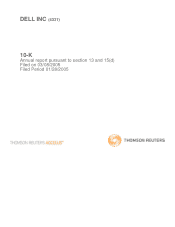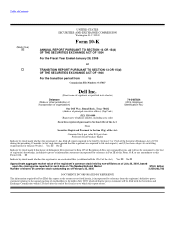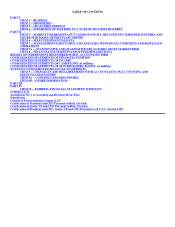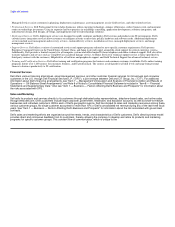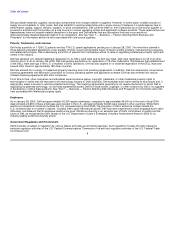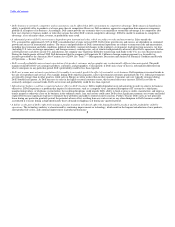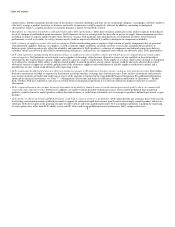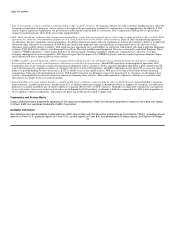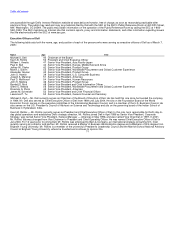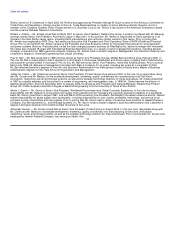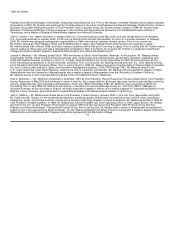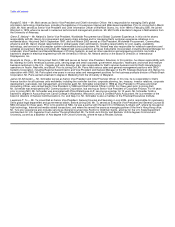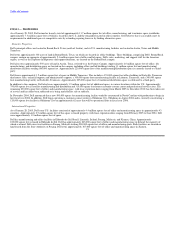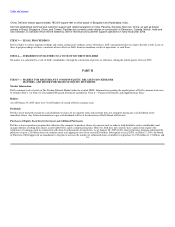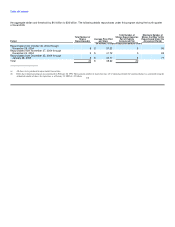Dell 2004 Annual Report Download - page 10
Download and view the complete annual report
Please find page 10 of the 2004 Dell annual report below. You can navigate through the pages in the report by either clicking on the pages listed below, or by using the keyword search tool below to find specific information within the annual report.
Table of Contents
Department of Justice, the consumer protection laws of the Federal Trade Commission, the export regulatory activities of the U.S. Department
of Commerce and the U.S. Department of Treasury, the import regulatory activities of U.S. Customs and Border Protection, the product safety
regulatory activities of the U.S. Consumer Products Safety Commission, and environmental regulation by a variety of regulatory authorities in
each of the areas in which Dell conducts business. Dell is also subject to regulation in other countries where it conducts business. Dell did not
have any material environmental remediation or other environmental costs during fiscal 2005. See "Item 1 — Business — Factors Affecting
Dell's Business and Prospects" for information about the risks associated with government regulation.
Backlog
Dell believes that backlog is not a meaningful indicator of net revenue that can be expected for any period. There can be no assurance that the
backlog at any point in time will translate into net revenue in any subsequent period, as unfilled orders can generally be canceled at any time by
the customer. At the end of fiscal 2005, 2004, and 2003, backlog was not material.
Geographic Areas of Operations
Dell conducts operations worldwide and is managed in three geographic segments: the Americas, Europe, and Asia Pacific-Japan regions. The
Americas region, which is based in Round Rock, Texas, covers the U.S., Canada, and Latin America. Within the Americas, Dell is further
segmented into Business and U.S. Consumer. The Americas Business segment includes sales to corporate, government, healthcare,
education, and small and medium business customers while the U.S. Consumer segment includes sales primarily to individual consumers. The
European region, which is based in Bracknell, England, covers Europe, the Middle East, and Africa. The Asia Pacific-Japan region covers the
Pacific Rim, including Australia and New Zealand, and is based in Singapore. In fiscal 2005, approximately 38% of Dell's consolidated net
revenue was attributable to sales outside the U.S.
As part of its global expansion efforts, Dell recently announced a new manufacturing facility in North Carolina, with production to begin in late
fiscal year 2006, and new customer-contact centers in Oklahoma, Canada, India, and El Salvador. Dell intends to continue to expand its global
infrastructure as its international business continues to grow. See "Item 1 — Business — Factors Affecting Dell's Business and Prospects" for
information about certain risks of international activities. For financial information about the results of Dell's operating segments for each of the
last three fiscal years, see Note 9 of Notes to Consolidated Financial Statements included in "Item 8 — Financial Statements and
Supplementary Data."
Dell's corporate headquarters are located in Round Rock, Texas. Its manufacturing facilities are located in Austin, Texas; Eldorado do Sul,
Brazil; Nashville and Lebanon, Tennessee; Limerick, Ireland; Penang, Malaysia; and Xiamen, China. See "Item 2 — Properties."
Factors Affecting Dell's Business and Prospects
There are many factors that affect Dell's business and the results of its operations, some of which are beyond Dell's control. The following is a
description of some of the important factors that may cause the actual results of Dell's operations in future periods to differ materially from those
currently expected or desired.
• General economic, business, or industry conditions may result in a decrease in net revenue. As a global company with customers in virtually every business
and industry, Dell's net revenue could deteriorate as a result of macroeconomic trends in both the U.S. and abroad. If the economic climate deteriorates,
customers or potential customers could reduce or delay their technology investments. As a result, Dell's net revenue and profitability could be negatively
affected. 7

